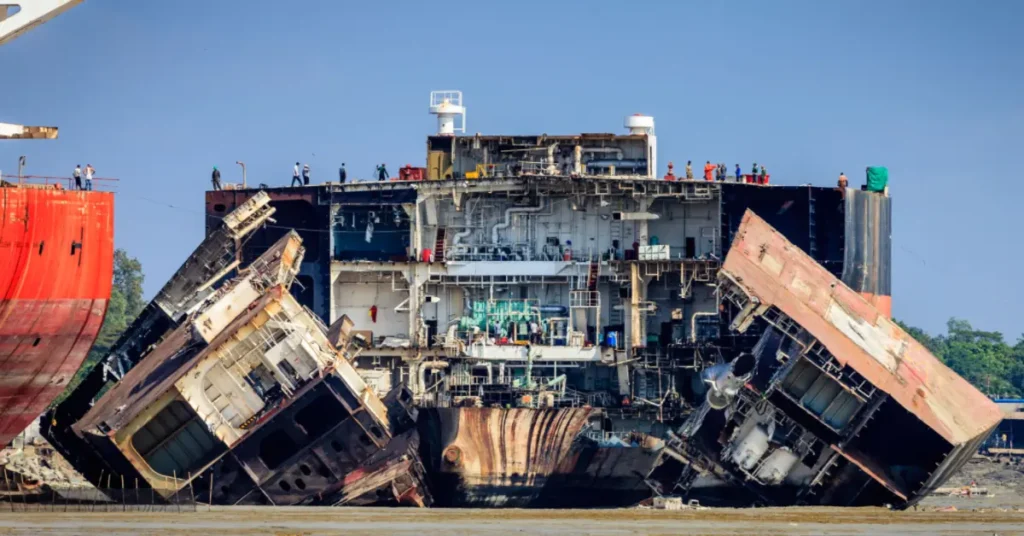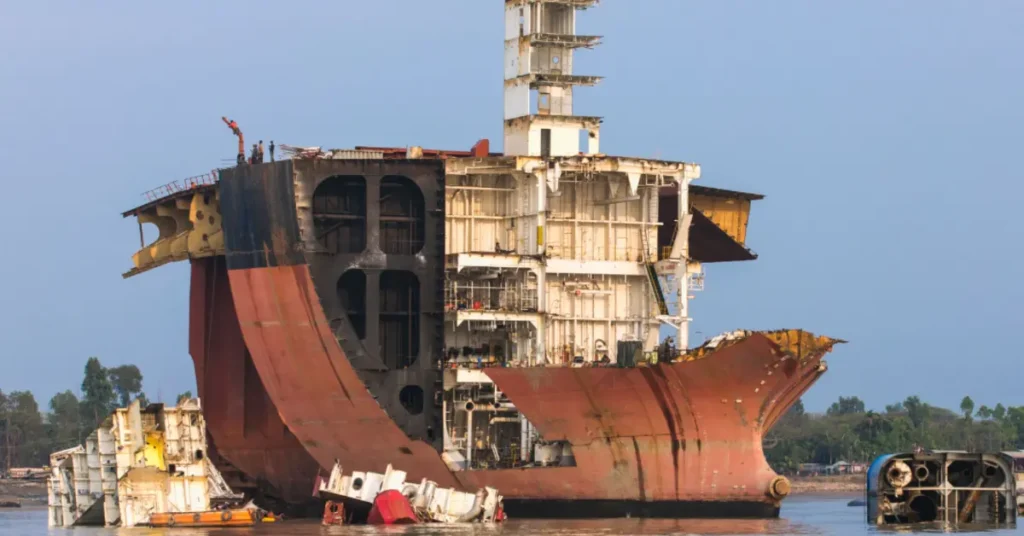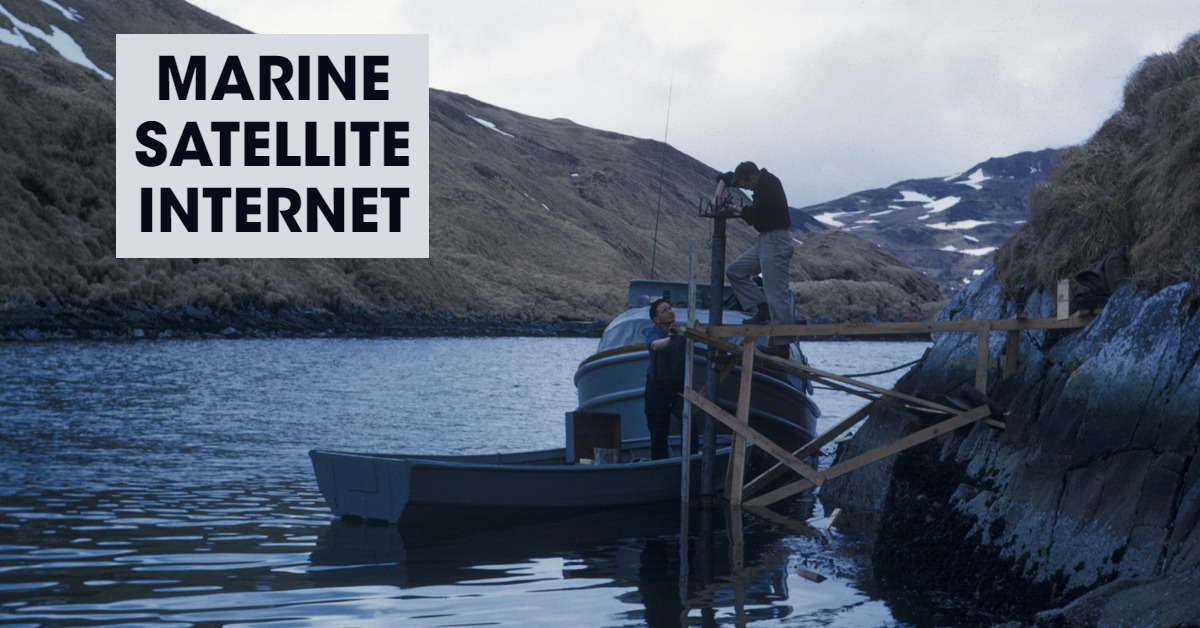Ship recycling is an important aspect of the maritime industry that has gained significant attention in recent years.
It is the process of dismantling ships that have reached the end of their useful life and recycling their materials for reuse. The practice has been around for centuries, but it has become increasingly important in recent years due to the environmental impact of shipbreaking.

Ship recycling is important for the environment for several reasons. First, it reduces the amount of waste that goes to landfills. Ships are made of various materials, including steel, aluminum, and other metals, as well as plastics, rubber, and other materials. Recycling these materials reduces the amount of waste that goes to landfills, which is important for reducing greenhouse gas emissions and preserving natural resources.
Additionally, ship recycling is an important way to reduce the carbon footprint of the maritime industry. By reusing materials, the industry can reduce its reliance on virgin materials, which require significant energy to extract and process.
Understanding Ship Recycling
Ship recycling is a process that involves dismantling end-of-life ships and recycling their components and materials. It is a crucial practice that has become increasingly important in recent years due to the growing concerns about the environmental impact of shipbreaking and the need to reduce the carbon footprint of the shipping industry.
The recycling process involves several stages, including the removal of hazardous materials, such as asbestos and lead, and the separation of various components, such as steel, aluminum, and copper. These materials are then recycled and reused in various industries, reducing the need for new production and minimizing waste.

Ship recycling is a complex process that requires specialized equipment and expertise. It is typically carried out in shipbreaking yards, which are located in various parts of the world, including South Asia, Turkey, and China. These yards employ thousands of workers who are trained to handle the complex and hazardous process of ship dismantling.
However, ship recycling is not without its challenges. The process can be hazardous to workers and the environment if not carried out properly. Therefore, it is essential to ensure that shipbreaking yards comply with the relevant regulations and guidelines, such as the Hong Kong International Convention for the Safe and Environmentally Sound Recycling of Ships.
Overall, ship recycling is an important practice that helps to reduce the environmental impact of the shipping industry and promote sustainability. By reusing materials and reducing waste, ship recycling helps to conserve natural resources and reduce carbon emissions.
The Environmental Impact of Ship Recycling
Ship recycling is a crucial process to reduce the environmental impact of maritime activities. However, the process of ship recycling can also have negative environmental consequences. The recycling of ships generates a significant amount of hazardous waste and pollutants, which can cause severe environmental damage if not managed properly.
The hazardous materials generated during ship recycling include oil sludge, heavy metals such as mercury and lead, asbestos, chemicals, plastics, and glass. These materials can be harmful to the environment, wildlife, and human health. The improper disposal of these materials can lead to contamination of soil, water bodies, and air.

Beaching is a common method of ship recycling in many countries, particularly in Asia. However, this method can cause severe damage to the environment. Beaching involves grounding the ship on a beach, mudflat, or sand. During this process, the ship’s paint, fuel, and other hazardous materials can leach into the surrounding environment, causing pollution.
To mitigate the environmental impact of ship recycling, it is essential to follow proper recycling practices. The recycling process should be conducted in an environmentally sound manner, with measures in place to minimize the risks and impacts of hazardous waste and pollutants.
In conclusion, ship recycling is essential for reducing the environmental impact of maritime activities. However, the process of ship recycling can also have negative environmental consequences if not managed properly. To minimize the risks and impacts of hazardous waste and pollutants, it is crucial to follow proper recycling practices.
The Human Health and Safety Concerns
Ship recycling is a hazardous industry that poses significant risks to human health and safety. Workers are exposed to a range of hazards, including asbestos, heavy metals, and toxic chemicals, which can cause long-term health problems such as respiratory diseases, cancer, and neurological damage. These risks are compounded by the fact that many shipbreaking yards are located in developing countries with inadequate health and safety regulations.
According to a study on factors affecting workers’ safety during ship recycling, the most common injuries include cuts, bruises, fractures, and burns. These injuries occur due to the use of outdated equipment, lack of personal protective equipment, and inadequate training. In addition, workers are at risk of developing musculoskeletal disorders due to the repetitive and physically demanding nature of their work.
To address these concerns, the International Maritime Organization (IMO) has developed guidelines for safe and environmentally sound ship recycling. The guidelines aim to protect human health and safety by ensuring that shipbreaking yards comply with international labor and environmental standards.
However, implementing these guidelines has proven challenging, particularly in developing countries where the majority of shipbreaking yards are located. Many yards lack the resources and infrastructure necessary to comply with the guidelines, and some owners are unwilling to invest in safer and more environmentally friendly practices.
Despite these challenges, the importance of prioritizing human health and safety in ship recycling cannot be overstated. The risks associated with shipbreaking are simply too high to ignore, and the long-term consequences of exposure to hazardous materials can be devastating. By implementing best practices and investing in safer technologies, the ship recycling industry can help protect workers and the environment while continuing to provide a valuable service.
Regulations and Conventions in Ship Recycling
Ship recycling is a highly regulated industry that involves the dismantling of ships that have reached the end of their operational lives. The process is governed by various international conventions and regulations that aim to ensure that the recycling of ships is done in an environmentally sound and safe manner.
One of the most important conventions in ship recycling is the Hong Kong International Convention for the Safe and Environmentally Sound Recycling of Ships (HKC). The HKC was adopted in 2009 and aims to ensure that ships are recycled safely and without posing unnecessary risks to human health and the environment. The convention will enter into force on 26 June 2025.
The International Maritime Organisation (IMO) is responsible for implementing the HKC and has developed guidelines for ship recycling facilities to ensure that they comply with the convention. The IMO also provides technical assistance to countries that need help in implementing the convention.
The Basel Convention is another international agreement that is relevant to ship recycling. The convention aims to minimize the generation of hazardous waste and to ensure that hazardous waste is disposed of in an environmentally sound manner. The convention has been ratified by 187 countries and territories worldwide.
In addition to these international conventions, the European Union (EU) has also introduced regulations governing ship recycling. The EU Ship Recycling Regulation requires all European ships to be recycled in facilities that meet certain environmental and safety standards. The regulation also requires shipowners to ensure that their ships are recycled in a safe and environmentally sound manner, regardless of where the recycling takes place.
Finally, the NGO Shipbreaking Platform is an organization that monitors and campaigns for the safe and environmentally sound recycling of ships. The platform provides information on the shipbreaking industry and advocates for stronger regulations to protect workers and the environment.
In conclusion, ship recycling is a highly regulated industry that is governed by various international conventions and regulations. These regulations aim to ensure that ships are recycled in a safe and environmentally sound manner and that hazardous waste is disposed of in an environmentally sound manner. The HKC, the Basel Convention, the EU Ship Recycling Regulation, the IMO, and the NGO Shipbreaking Platform are all important entities in the regulation of ship recycling.
Ship Recycling Plans and Documentation
Ship recycling plans and documentation play a crucial role in ensuring safe and environmentally sound ship recycling. According to the International Maritime Organization (IMO), a ship-specific Ship Recycling Plan must be developed before recycling, taking into account the IMO guidelines. The plan should contain information on establishing, maintaining, and monitoring Safe-for-entry and Safe-for-hot work conditions, as well as how the materials, including those in the Inventory of Hazardous Materials (IHM), will be handled, stored, and disposed of.
In addition to the Ship Recycling Plan, a survey must be conducted to ensure that the ship is ready for recycling. The survey should include an assessment of the condition of the ship, its equipment, and systems, as well as an inventory of hazardous materials. The survey should be conducted by a certified third-party organization. Additional surveys may be required during the recycling process to ensure that the ship is being recycled by the Ship Recycling Plan and the IMO guidelines.
Documentation is also an essential component of ship recycling. The Ship Recycling Facility Plan outlines the procedures and processes for safe and environmentally sound ship recycling. The International Ready for Recycling Certificate (IRRC) is issued upon completion of the recycling process and serves as proof that the ship has been recycled by the IMO guidelines. The IRRC is required for ships flying the flag of an IMO Member State.
Overall, ship recycling plans and documentation ensure that ships are recycled in a safe and environmentally sound manner, minimizing the impact on the environment and protecting the health and safety of workers.
The Role of Ship Owners and Stakeholders
Ship recycling is a complex process that involves various stakeholders, including shipowners, governments, and non-governmental organizations (NGOs). The role of shipowners and stakeholders is crucial in ensuring that the process is conducted in an environmentally responsible manner.
Shipowners have a responsibility to ensure that their vessels are recycled in an environmentally sound and safe manner. They can achieve this by complying with international regulations, such as the Hong Kong Convention and the Basel Convention. These conventions provide guidelines for the safe and environmentally sound recycling of ships.
In addition to complying with regulations, shipowners can also adopt voluntary initiatives to ensure responsible ship recycling. For example, the Ship Recycling Transparency Initiative (SRTI) is a voluntary initiative that aims to improve transparency in the ship recycling industry. By signing up for the SRTI, shipowners can demonstrate their commitment to responsible ship recycling and improve their reputation among stakeholders.
Stakeholders, including NGOs, can also play a critical role in ensuring responsible ship recycling. For example, the Baltic and International Maritime Council (BIMCO) is a non-governmental organization that guides shipowners on responsible ship recycling. BIMCO’s guidelines cover all aspects of ship recycling, from the selection of recycling yards to the handling of hazardous materials.
The maritime industry as a whole can also work together to promote responsible ship recycling. For example, the Global Maritime Forum is a platform that brings together stakeholders from across the maritime industry to discuss issues related to sustainability and responsible ship recycling.
Overall, the role of shipowners and stakeholders is critical in ensuring that ship recycling is conducted in an environmentally responsible manner. By complying with regulations, adopting voluntary initiatives, and working together as an industry, shipowners and stakeholders can promote responsible ship recycling and protect the environment.
Sustainable and Environmentally Sound Ship Recycling
Ship recycling is an essential practice that aims to minimize the environmental impact of retired vessels. Sustainable and environmentally sound ship recycling is a process that ensures that all the materials and equipment used in the manufacture of a ship are disposed of in a way that minimizes harm to the environment.
Sustainable ship recycling is critical for the environment because it reduces the amount of waste that ends up in landfills and oceans. The International Maritime Organization (IMO) estimates that approximately 90% of the materials used in a ship can be recycled. By recycling these materials, the amount of waste generated is reduced, and the environmental impact of the ship is minimized.
Environmentally sound recycling practices also help to reduce the pollution caused by shipbreaking activities. When ships are dismantled, they can release hazardous materials such as asbestos, heavy metals, and oil into the environment. Proper recycling practices ensure that these materials are safely removed and disposed of, reducing the risk of pollution.
Sustainability is also a crucial factor in ship recycling. By recycling materials, the demand for new materials is reduced, which helps to conserve natural resources. Additionally, sustainable ship recycling practices can provide economic benefits to local communities by creating jobs and generating revenue.
Green ship recycling is an emerging trend in the industry that aims to reduce the environmental impact of shipbreaking activities further. Green ship recycling practices focus on reducing greenhouse gas emissions, minimizing waste, and promoting the use of renewable energy sources.
Overall, sustainable and environmentally sound ship recycling is critical for the environment and the economy. By recycling retired vessels, we can reduce waste, minimize pollution, conserve natural resources, and promote sustainability.
Ship Recycling in Different Countries
Ship recycling is an important industry that supports the economies of several countries, especially developing ones. However, the industry faces challenges in terms of occupational safety and environmental impact.
One of the largest ship recycling countries in the world is India, particularly the town of Alang. Alang is home to the world’s largest ship-breaking yard, where around 200 ships are dismantled each year. However, the industry in India has been criticized for its poor working conditions and lack of environmental regulations.
Bangladesh is another major player in ship recycling, with the industry concentrated in the coastal town of Chittagong. The industry in Bangladesh has also faced criticism for its poor working conditions and environmental impact. However, the government has taken steps to improve the industry’s safety and environmental standards.
Pakistan is also a significant ship recycling country, with the industry concentrated in the port city of Gadani. However, the industry in Pakistan has faced criticism for its poor working conditions and lack of environmental regulations.
China is another major player in ship recycling, particularly in the Guangdong province. The industry in China has been growing rapidly in recent years, but it has also faced criticism for its environmental impact.
Turkey is a significant ship recycling country in Europe, with the industry concentrated in the city of Aliaga. The industry in Turkey has been praised for its modern facilities and high environmental standards.
Overall, ship recycling is an important industry for developing countries, but it must be done in a safe and environmentally responsible manner. Governments and industry stakeholders must work together to improve working conditions and environmental standards in the industry.
The Economic Impact of Ship Recycling
Ship recycling has a significant economic impact on the global economy. According to a study commissioned by the World Bank, the ship recycling industry generates approximately $1.5 billion annually and employs over 100,000 people worldwide. Ship recycling yards are often located in developing countries, and the industry provides critical support to local economies by creating jobs and stimulating economic growth.
The ship recycling industry also supports the construction industry by providing a significant source of steel and other materials. Shipbreaking yards supply a large quantity of scrap metal to the steel and iron industries and reduce the need to produce virgin metals to meet demand. This helps to conserve natural resources and reduce the environmental impact of mining and other extractive industries.
Ship recycling also plays a crucial role in waste management. Ships that are no longer seaworthy or economically viable are often abandoned or left to rust in harbors and ports, posing a significant environmental risk. By recycling these ships, the industry helps to reduce the amount of waste in the environment and prevent pollution.
Overall, ship recycling has a positive impact on the global economy, providing jobs, supporting the construction industry, and reducing the environmental impact of waste management.
The Future of Ship Recycling
The future of ship recycling is closely tied to the decarbonization of the shipping industry. As new ships are designed and built with sustainability in mind, existing ships will need to be retrofitted or replaced to meet new environmental standards. This will increase the demand for ship recycling facilities that can safely and efficiently dismantle old vessels and recover valuable materials.
The World Bank has recognized the importance of sustainable ship recycling and has developed guidelines for the industry. These guidelines include statements of compliance that ship owners and operators must adhere to to ensure that their vessels are recycled in an environmentally responsible manner. The guidelines also encourage the development of ship recycling facilities that meet international standards for safety and environmental protection.
The EU Ship Recycling Regulation is another important development in the industry. This regulation requires EU-flagged vessels to be recycled at EU-approved ship recycling facilities. The European List of ship recycling facilities provides a list of facilities that meet these standards.
Offshore structures are also subject to recycling requirements. The life cycle of offshore structures is often shorter than that of ships, and decommissioning activities can generate significant amounts of waste. The development of offshore recycling facilities will be an important factor in the future of the industry.
In summary, the future of ship recycling will be shaped by the decarbonization of the shipping industry, the development of new ships, and the expansion of ship recycling facilities. The World Bank and the EU Ship Recycling Regulation have provided guidelines and standards that will help ensure that ship recycling is done in an environmentally responsible manner. As the industry continues to evolve, it will be important to develop new technologies and practices that can further improve the sustainability of ship recycling.
- Sustainable and Luxurious: Discovering Split’s Yachting Paradise – April 26, 2024
- MarineTraffic vs VesselFinder: Which Is Better Vessel Tracking Service? – February 14, 2024
- Port Costs: A Comprehensive Guide to Port Dues and Fees for Cargo Ships – February 12, 2024




Leave a Reply